| The
village of Embrosneros is situated at the foot of the Lefka Ori, 5 km south
of Vrises. It is an ancient village that can be dated to at least 1355,
when it belonged to the Latin patriarch of Constantinople.
|
| Embrosneros
is best known for the notable farmer and janizary Alidakis,
who had a big estate in the village. The Greek word for the estate is 'pyrgos',
meaning 'a high fortified tower', and this matches perfectly the appearance
of the ruins. |
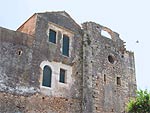
|
|
|
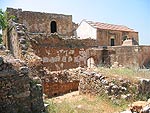 |
On
the outskirts of the village you can still see the remains of the estate,
which for the time being
(2006) is under restoration. |
|
|
|
|
|
|
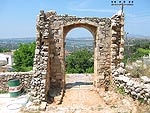 |
Especially
the entrance is spectacular with remains of the carved decorations. |
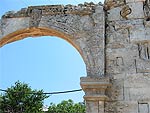
|
|
|
|
|
|
|
| Beneath
the entrance, which is raised over the terrain by an "approach ramp", |
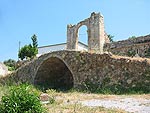
|
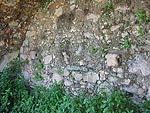 |
there
is a room for the horses, as you can see from the three
stones in the wall where they could tie them. |
|
|
|
|
|
|
|
| Even
if the estate is in ruins, you can easily get an idea of its former size.
|
| An
old folksong describes Alidakis' wealth:
|
| Είχε
κοπάδια
αλάλητα και
κάμπους και
λιβάδια |
|
He
had innumerable flocks of sheep and fields and meadows |
| και
μητατοκαθίσματα
με βρύσες και
πηγάδια. |
|
and
herds' huts with springs and wells. |
| Δάση,
βουνά και χειμαδιά,
στέρνες και
ποτιστήρια, |
|
Forests,
mountains and winter pasturelands, cisterns and watering places, |
| κουράδια
τ'
αγριόβουιδα,
κοπάδια τα μπεγίργια. |
|
herds
of wild oxen, flocks of goats. |
| Μητάτα
εικοσιτέσσερα
έσταινε στην
αράδα, |
|
Twenty
four herds' huts he had in a row, |
| ούλη
τη Ρίζα ώριζε,
χωράφια και χαλέπες. |
|
he
ruled all the Riza *, all the fields, all the slopes. |
|
|
|
|
*
the area north of the Lefka Ori |
|
|
|
|
|
|
|
| After
the defeat of the Daskalogiannis revolt in 1770, Alidakis assembled an
army in order to purloin the Cretans' pastures. Anyway, this came to
their ears, so Manousakas from Imbros gathered a crowd of men on Askyfou,
from where they marched to Embrosneros to kill Alidakis. |
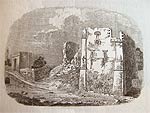
|
|
|
|
|
Alidakis'
"Pyrgos",
from Robert Pashley's book |
|
|
|
|
|
|
| Λέει
τους ο Μανούσακας
με τη χοντρή
φωνάρα, |
|
Manousakas
said to them with his deep voice, |
| και
με την
ποκαμίσαν
του και την
πλατέ ζωνάρα: |
|
Wearing
his spectacular dress and broad belt: |
| "Μωρέ
παιδιά,
γροικίσετε
κι εμένα τη
βουλή μου |
|
"You
men, listen to my proposal, |
| απού
σε τέθια
βάσανα άσπρισ'
η κεφαλή μου. |
|
That
caused me so many difficulties that my hair turned white. |
| Δεν
κρίνω ν'
ανημένομε κι
έτσι να καρτερούμε, |
|
I
do not think that we shall hesitate and just wait, |
| τον
Αληδάκη
γλήγορα επά
θα τον
δεχτούμε, |
|
Because
soon we shall see Alidakis here, |
| μόν'
ας
αποφασίσομε
κάτω να κατεβούμε |
|
So
let us decide to go down |
| στο
Μπρόσνερο στον
πύργο του να
πά να τόνε
βρούμε." |
|
To
Brosnero, to his tower, and find him there." |
| Βαθειάν
αυγή
σηκώνουνται
κι ούλοι
μονομεργιούσι |
|
Before
dawn everyone stood up and set out, |
| και
τα γλυκοχαράγματα
το Μπρόσνερο
κυκλώνου. |
|
And
in the early morning they encircled
Brosnero. |
| Κι
απ' ής και τσι
σκοτώσασι, μέσα
στον πύργο μπήκα |
|
Having
killed his men they broke into the tower |
| κι
επήραν ό,τι
βρίσκασι και
πράμα δεν
αφήκα.
|
|
and
took everything that they found. They left nothing at all. |
|
|
|
|
|
|
|
|
|
|